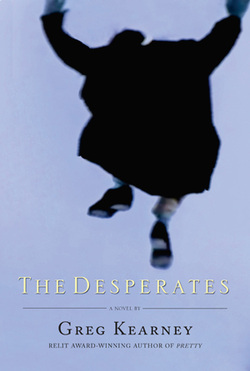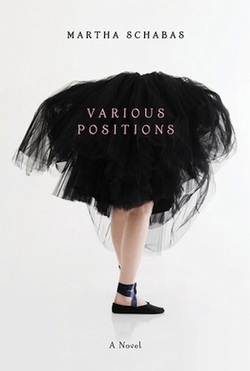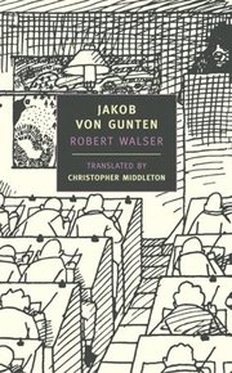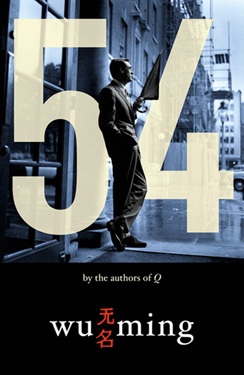 The Desperates The DesperatesGreg Kearney Cormorant, 2013 Lurking behind the motley crew of Kearney’s tremendously funny first novel, The Desperates, lies a surprisingly sober question: What comes after AIDS? What does it mean to survive? Granted that the intersecting stories of failed spoken word poetry debuts, failed religious conversions, failed launches of button exhibitions—yes, you read those correctly—may not initially appear as mechanisms of survival, but deeply entrenched in Kearney’s novel is a clinging to failure as coping method. If these characters fail to live, then they also live to fail. Take Edmund, who after years of shuffling around his old mansion following the death of his lover, finds himself pursuing the much younger, meth-addicted singer-who-doesn’t-sing Binny in a Toronto dive bar. As Edmund joins Binny in constant pursuit of drugs and kinky sex, he discovers networks of other AIDS survivors coping with their isolation and loss in similar ways. Then there is Teresa, who copes with her terminal cancer by seeking revenge against her unwitting enemy, Jocelyn, by attempting to seduce Jocelyn’s mayor husband. After initially feigning interest in attending Digger’s church, Teresa becomes enamored with religious life, and attempts to find community while unknowingly befriending the church’s more fanatical, and outcast, members. One scene finds Teresa in the midst of a botched exorcism, which she conflates with standard religious practice. Proving once again that misery loves company, Teresa doggedly pursues these outcast members of the congregation only to be finally rejected by them. While such acts of desperation may not seem like the makings of comedy, Kearney’s novel is serious about frivolity. Grandiose gestures follow each other so swiftly that they are ultimately (and intentionally) rendered banal, leaving behind a series of misfits who one-up themselves in borderline slapstick fashion. But behind comedic turns, The Desperates exposes a world populated by the unattended, the socially isolated, and the profoundly lonely. As society’s attention turns away from AIDS suffering, so too does its sympathy for Edmund. Edmund’s attempts at nighttime adventure—if I can call it that—with Binny come to mask a dearth of possibilities for Edmund in the light of day. And Teresa’s attempts at the brink of death to achieve ‘the good life’ only emphasize her remove from a society whose approval she so desperately craves. Kearney’s prose is fast paced and light footed, and the novel is written in such a way that Kearney provides only kernels of insight, aptly leaving the reader to decipher the social mores of church going and drug dealing. Kearney far from holds back in his stark, and occasionally devastating, renderings of poverty, addiction, and the effects of a stilted imagination. In the end, The Desperates resolutely refuses to provide its cast of characters with redemption of any sort: Edmund will continue to shuffle, Teresa will die. But in failing to survive, in being desperately desperate, each will have left their mark. Matthew Halse is a doctoral candidate at Western University. Twitter: @matthewhalse
 Various Positions Various PositionsMartha Schabas Anchor Canada, 2013 What kinds of positions does Various Positions have in mind? Dance positions, sex positions, moral positions? The novel's tantalizing front cover depicts a ballerina (from behind) taking a bow; on the back cover, her legs dangle in the air, as if she has just been hanged. The pages in between these two darkly comic images suggest that the various positions of ballet, sex and morality are intimately linked, and frequently inseparable. When Georgia, a talented but shy teenaged dancer, is accepted into the prestigious and cutthroat Royal Ballet Academy, she savors its disciplined commitment to excellence. Appalled by her parents' dysfunctional relationship and her friends' obsession with boys, Georgia tries to distance herself from sexuality by diving into the world of professional ballet, a supposedly pure and passionate realm, driven by aesthetic splendour instead of desire. However, as Georgia and her charismatic instructor, Roderick, become suspiciously close, Georgia begins to blur the lines between artistry and sexuality, and she soon discovers that she is just as corruptible, just as fallible, just as human, as those around her. It is a shame that Various Positions was released shortly after Black Swan, a far less compelling and nuanced work of art. Although they both address issues of artistic and sexual obsession, Schabas chooses subtlety over psychodrama and realism over sensationalism. She crafts a complex dialectic between gender, sexuality and art, while grounding her ideas in everyday moral dilemmas. She never settles for conventional twists or tidy resolutions, and her suggestive dialogue and suspenseful plot are only enhanced by her sharp eye for imagery and her finely-tuned ear for lyricism. For those who were intrigued by Black Swan's subject yet disappointed by its execution, who longed for characters instead of archetypes and ideas instead of platitudes, Various Positions is the book for you. It is an exhilarating, thought-provoking--and, at times, unsettling--debut by one of Canada's most promising writers. Chris Gilmore is currently pursuing a Masters in English and Creative Writing at the University of Toronto. He writes fiction, plays and screenplays.
 Jalob von Gunten Jalob von GuntenRobert Walser NYRB, First Edition A BEDTIME STORY FROM MAGMA HEAD: An appreciation of Robert Walser's Jakob von Gunten Guymo the Magma Head entered Ian Mieuxberry's boxcar situated in the lush greenery of Loni Beach Forest, a mere pubic hair's north of Gimli. Like every evening, he proceeded to silently and gently tuck all the Drones in. Upon completion of his nightly duties, he took his place upon the tree stump in the centre of the boxcar, lit the oil lamp, placed a needle on the phonograph which released a gentle Nat Schilkret waltz into the night air and delicately removed a slender volume from his pocket. The twinkle in his eye and an ever-so slight pursing of the lips was enough to instill curiosity amongst the Drones as to what manner of tale would be read aloud to complete a most perfect day of worshipping the newly crowned Fjallkona and greedily dining on Hardfiskur, Skyr and Vinatarta. “Will it be the Huysmans?” Carl, the Love Doctor ejaculated. “Bruno Schulz would do me very nicely,” cooed Big Julie's Greggy. “You know what I want,” growled John, the Claw, “Ruskin's my man.” “Oh thtuff it, Claw!” Mieuxberry volleyed with the pronounced lisp that consumed his palate whenever Claw haughtily implied that he’d never hear “Ethics of the Dust”, his bedtime words of choice. “I’m good with whatever,” Kyle, the Squid opined cheerfully. “Will it be the Huysmans?” The Love Doctor ejaculated once again. “Thtuff it, L.D. We had the bloody Huythmanth all fucking week becauthe of you.” “I’d settle for some Bataille,” The Love Doctor offered meekly. Magma Head chuckled, shaking his elephantine skull to and fro. “Tonight,” he said, “I have something very new, very special and very appropriate for you lads—especially in light of the magnificence of this year’s Fjallkona. This, I assure you all, will prepare you more than adequately for a proper life of subservience and inconsequence. You will learn what it is to serve, to keep your eyes lowered, to defer to every living creature above your station which, for all of us, is indeed every living creature. So rest thine weary, unworthy and slavish heads fellows, put aside thine petty squabbles and allow me to purvey the greatest words I have yet to lay my eyes upon.” "Your greatneth, dearetht Thir, ith indeed Our Greatneth!" cooed Mieuxberry, for he was the Mieuxest of them all. "Pshaw! Greater than Huysmans?" the Love Doctor spewed petulantly. “Greater than Hamsun?” Big Julie's Greggy queried. "Greater than Calvino?" Squid implored. "Greater than Ruskin?" growled the Claw. “Greater than all,” beamed Magma Head. He bowed his head over the Holy Book of Walser and in a tone of dulcet, he did read: “One learns very little here, there is a shortage of teachers, and none of us boys of the Benjamenta Institute will come to anything, that is to say, we shall all be something very small and subordinate later in life . . .” The End Greg Klymkiw is a writer, teacher and filmmaker. He produced films by Guy Maddin, Cynthia Roberts, Alan Zweig and many others. For 13 years he was Producer-in-Residence and Senior Creative Consultant at Norman Jewison's Canadian Film Centre. His writings on film can be found at KLYMKIW FILM CORNER and ELECTRIC SHEEP.
 BOOK XVII and BOOK XVIII BOOK XVII and BOOK XVIII Muga River, Boadella, Spain 6" x 4" x 1" each Spanish Broom. Wild fennel. 2008 It's unlikely that you'll have your hands on one of Basia Irland's Ice Books any time soon. The books are literally made of ice and my recommendations--Books XVII and XVIII—melted into the Muga River years ago. Nonetheless, I recommend BOOK XVII with its Spanish Broom seed text and BOOK XVIII with its wild fennel for the meditations on ecological restoration and duty to downstream neighbours that they give rise to. Irland's ice books are temporal, sensual, living objects created and released in the spirit of bearing witness to human degradation of riparian zones and the climate crisis, which has serious implications for the fresh water of the world. While Irland has traveled to many of the earth's aqueous arteries, the artist collaborates with community members to collect ice book water. People cooperate to collect water from multiple parts of a river. The collection engages the desire to restore riparian zones to health and speaks to the shared condition of living downstream. Irland also collaborates with stream ecologists, biologists, and botanists on the Ice Books. Together they select the best seeds for the riparian zone in question. Seeds take root along river banks, help sequester carbon, hold banks in place, and shelter wildlife. This fall, the people of Yellow Springs, Ohio will have access to a book carved from Ohio river water and inscribed with native river-side seed. Meanwhile, the rest of us have gallery showings and the crisp ice book images that festoon the author, poet, sculptor, installation artist, and activist's website. Christine LeClerc is a Vancouver-based author and activist. Her research revolves around culture and energy. You can follow her on Twitter @xineleclerc.
 Novel 54 Novel 54Wu MIng 2005 Wu Ming’s novel 54 (English translation 2005 by Simon Whiteside) is an unusual experiment in collective authorship—the writers are five Italian author-activists. But you shouldn’t read it because it’s an interesting concept; read it because it’s an entertaining novel that successfully embraces satire, tragedy, and political commentary. It is set in the year 1954 and weaves together multiple narrative strands that investigate the realities of postwar Italy and Yugoslavia, as well as that era’s creeping Hollywoodization of the non-American world. Characters range from partisan and communist fighters in WWII, to young Italians with few prospects, to mobsters who have been (literally) lifted straight from the movies, to Tito and Cary Grant. Bit players include MI6 and KGB agents, as well as a television set: a McGuffin Electric Deluxe that has found itself in Italy, and that feels insufficiently appreciated by the locals (part of the novel is narrated from its perspective). And yes, Wu Ming is fully aware of the connotations of using a “McGuffin” as a plot device, since Alfred Hitchcock makes an appearance in 54, too (although one of the mob hangers-on persists in believing that he is actually Winston Churchill). The plotline that may be most appealing to an audience in 2012 involves young Pierre Capponi, whose socioeconomic position closely parallels that faced by many young adults in Europe and North America today. Pierre finds himself in his early twenties in a country that has no promising employment prospects for him or his friends, and in which you need connections to secure basic work at a local bar. His girlfriend is married to an older doctor who can provide for both her and her PTSD-afflicted brother. Pierre’s frustration with his stagnant life ultimately leads him down strange and sometimes criminal paths, and gives us a visceral understanding of how and why populist revolutions (including communist ones) happen. Wu Ming was prescient, for 54 was completed in 2001, well before the current economic crash, but the novel reminds us that the historical questions and predicaments of the postwar years have far more staying power than we may like to think. For more information about Wu Ming visit the Wu Ming Foundation. Amy Mitchell has a PhD in Modernist poetry from Western University. She is currently a Professor of English and Writing at Fanshawe College.
|
RUSTY RECOMMENDS
In the spirit of supporting writing—especially writing that's off the radar or under appreciated—we want to know what you are excited about reading and what you think we should be reading. Your recommendations should be paragraph length (approximately 250 to 300 words) and should briefly summarize the book and detail why you are recommending it or why you think others should read it. Send our reviews editor Aaron Schneider your recommendations of Canadian and International fiction and poetry. Please write "Rusty Recommends" in the subject line. Include your (250 to 300 word) recommendation, name, and a link to your website, blog, or social media site (if you have one). Selected recommendations will be posted on our website. We will contact you if your recommendation is selected for publication. There is no payment for publication of Rusty Recommends. Archives
July 2015
Categories
All
Rusty Recommends Editor:
Dr. Aaron Schneider completed a PhD. in Canadian Literature at Western University where he currently teaches courses in public speaking, political rhetoric and Canadian Literature. He is excited about bringing together his interests in World and Canadian Literature. He is the co-founder and co-editor of The Rusty Toque and Western's online student journal Occasus. |

 RSS Feed
RSS Feed
